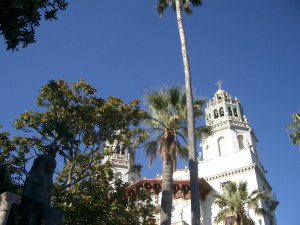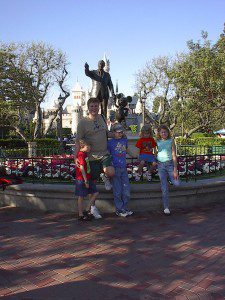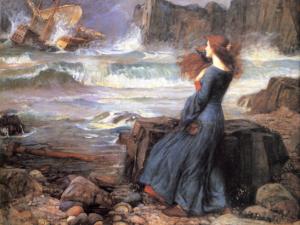Inauthenticity is the unpardonable sin of American college culture. Do as you will as long as you will it (and it doesn’t hurt someone. . . whatever that means). And yet there is something to be said for the “accidentally inauthentic” at least for the moment. We do not know ourselves, none of us, so all our Facebook, blogs, and work is more than a little inauthentic. One sign of a deeply disturbed person is that they do not see where the edges of the inauthenticity have grown worn. The good man works to remove the mask where he can. The bad man never sees there is a mask or replaces the worn out mask with a “new and improved” bit of fakery.
All our works hide and reveal . . . and love demands eventual authenticity. The college students are on to something . . . as they often are. Our greatest works are often the most revealing: both of our true selves and where we are kidding ourselves.

Disneyland is one of my favorite “fake places” and Hearst Castle the most disturbing. Disneyland is built on the happy memories of a decent mid-western man. His memory is flawed and the elements might jar against each other if they were united by the man himself. Disneyland is Walt’s magic kingdom, but not the kingdom of a grifter, a narcissist, or a tyrant. It is a brilliant man wishing to share his visions with the world in a constantly changing imaginative palette. If money was there to be made, so much the better, but Walt built that train to ride himself and with his guests. Our children (now adults) could grow up at Disneyland happily because Disneyland was for people and not for Walt: a common man.
At Hearst Castle, money chases style in this second bit of Southern California fakery and at times there is beauty, but mostly pitiable architectural self-indulgence. Things that do not fit together are forced together like a Victorian knick-knack shelf. There is charm to the grandmother’s knick-knack shelf if it is the story of interests over a lifetime, but when swollen with the money of a bad man with weird obsessions it becomes ugly. If every man’s home is his castle in English common law, Hearst was determined to show he was no common man and at this he succeeded. He was an uncommon man: a wicked one.
Hearst Castle is inauthentic but also revealing. Just as a tour of Disneyland is a walk through a brilliant and happy mind, that of Walt Disney, a walk through Hearst Castle is a journey into the psychosis of a tyrannical man. What Walt built, he built to share and if he did not (quite) know himself, he invited scrutiny and criticism through the press and millions of visitors: vox populi vox dei. At least for Heart’s lifetime, you went to Hearst Castle to pay court to the King: rex lex.

If you spend enough time at Disneyland, you begin to see Walt’s pain about his father’s failures. He gave millions of children (especially when Disneyland did not charge admission to the park itself) more innocent pleasure than he received in his own childhood. You might pity Walt, but you never fear him. Hearst strikes you utterly differently: a little man lusting for power. Spend enough time in Hearst Castle and you begin to wonder where the dungeon is located.
To be inauthentic comes with the broken nature of the world. We took the good world God made and smashed it and so humans are born into a broken good place. The world reflects God’s mind but also the mind of His creatures: mankind. We find a mountain and create a strip mine. We find a canyon and create a dump. We find a mysterious undersea creature and cry “monster!” and kill it.
We are children of a Creator: God’s creation. We create and sometimes the result is Mickey Mouse and sometimes the result is the Gulag Archipelago. If we have these inner demons, inauthenticity, in the short term, we can protect our neighbors from our inner demons while we get help.
Help we need. Nobody wants Stalin to be himself. Nobody should have let Hearst be himself, but a combination of money and power caused sycophants to let a man who could have been great become gruesome. In the end, nobody loved Hearst enough to tell him the truth about himself or Hearst did not love his true self enough to hear it. His evils died with him, but his works linger, revealing the beauty in every man, the fakery, and the ugly tyranny at his heart.
Love demands authenticity, but is patient while the beloved learns the hard lesson Socrates and Jesus demand: know yourself and in knowing yourself, change. Love demands that I tell the beloved who I am, so far as I know who I am, so that I could become the man I should be. Love sees the potential, but also demands change.
Be patient fellow students: we are both questing for authenticity. You reveal my flaws and I should be thankful for this good work and I am sorry when I am not. My job as a teacher is to help you, slowly, see your own areas of self-ignorance or (more often!) to be silent about them see so you can tolerate the pain of your early days of self-realization. It is hard to take even the smallest speck of dirt from our mind’s eye!
We both can pray (with mixed authenticity and some sincerity): Lord Jesus Christ, son of God, have mercy on us, sinners. We know God hears our best and will, as slowly as Love can, root out the rest.















